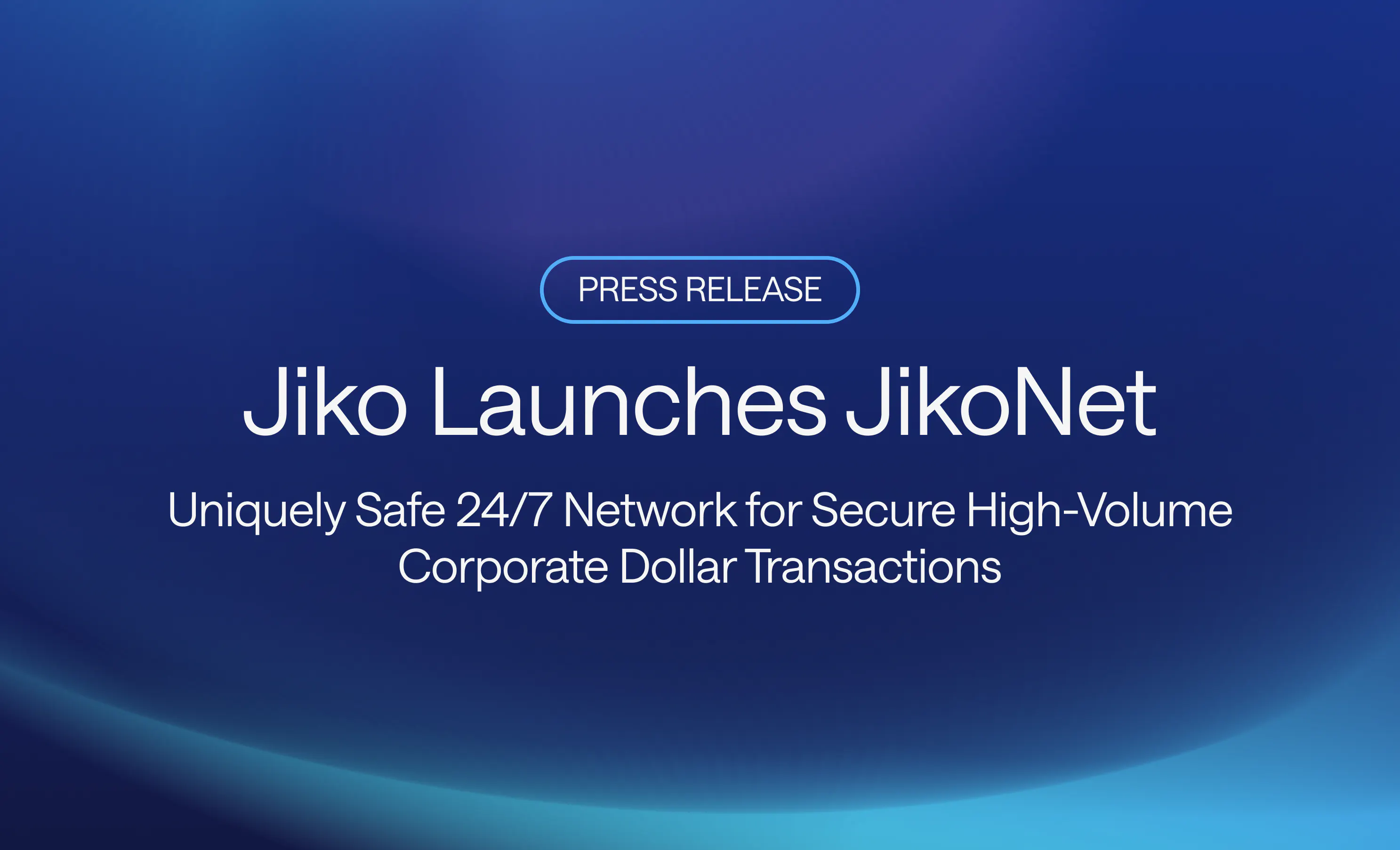How JikoNet Solves For Real-Time Payments Hurdles in the U.S.
Financial institutions, regulators, and current solutions like FedNow and the RTP® network are navigating challenges to provide a trusted and scalable network for treasurers handling high-volume, sensitive transactions. In the spring of 2025, we launched JikoNet, a uniquely safe 24/7 network built on a modern tech stack that bridges current RTP gaps with its T-bill deposit model and modern tech stack.

In our previous blog post, "The Real-Time Payments Race: Where the US Stands and What’s Next," we explored the challenges impeding the widespread adoption of real-time payments (RTP) in the U.S. These challenges include balance sheet risks, fraud prevention, legacy infrastructure, unoptimized deposits, and regulatory oversight. JikoNet addresses each of these issues head-on, offering a comprehensive solution for the modern financial professional.
What is JikoNet?
JikoNet is a real-time settlement network that enables 24/7/365 high-volume transactions while keeping funds continuously invested in U.S. Treasury bills (T-bills). Built on Jiko’s proprietary bank and technology platform, every transaction on the network is facilitated through real-time liquidation and reinvestment of T-bills. Each transaction occurs between Jiko Pockets, which are transactional accounts that programmatically keep client funds invested in T-bills while making them available for settlement at any time.
When a transfer is initiated, JikoNet immediately liquidates the sender’s T-bill holdings, converts the proceeds to cash, and settles the transaction on Jiko’s internal ledger. The receiving Pocket then reinvests the incoming funds into T-bills almost instantly, minimizing idle cash and maximizing yield. Because Jiko operates as both a nationally regulated bank and a registered broker-dealer, these transactions take place entirely within a unified, regulated system. The result is a modern, secure, and scalable payments infrastructure that bridges the gap between real-time money movement and safe money storage.
Solving the Structural Challenges of Real-Time Payments
Eliminating Bank Balance Sheet Risks
Real-time payment systems like FedNow and RTP® are accessed through banks operating under traditional banking models, where the majority of client deposits are invested by the banks (through lending and other vehicles), exposing corporate cash to leverage and balance sheet risks.
Facilitating real-time payments requires banks to maintain sufficient liquid assets to meet unpredictable outflows, which can be particularly challenging. Because only a fraction of customer deposits are held in liquid form, large and/or unexpected RTPs can strain a bank’s ability to settle the transactions. When liquidity falls short, access to cash may be delayed or disrupted, introducing operational risk for treasurers seeking to move funds with speed and certainty.
JikoNet addresses these challenges by operating outside the traditional deposit-lending framework. Client funds are directly invested in U.S. Treasury bills, so Jiko Bank’s balance sheet is completely de-levered. This model eliminates the need for capital buffers and exposure to institutional leverage, allowing JikoNet to facilitate large, real-time transactions without accumulating balance sheet risk. The result is a scalable network capable of handling high volumes and large payments around the clock, that provides clients with a secure and efficient real-time payments solution.
Modern Infrastructure Built for Real-Time
Most U.S. banks still operate on legacy core systems that were built for a slower, batch-based financial environment, optimized for ACH and wires, not real-time payments. Many financial institutions rely on established reconciliation and reporting cycles that don’t accommodate real-time payment flows, often settling transactions just once per day.
As a result, core banking systems and operational workflows are not natively equipped to handle continuous settlement or always-on fund availability. The majority of financial institutions experience challenges in their backend legacy systems to facilitate instant payments and would require an upgrade to their core systems before introducing real-time payment functionality, which can result in delays, costs, and integration risk.
JikoNet was purpose-built for modern financial demands. It runs on a contemporary, privacy-first technology stack that avoids the constraints of legacy infrastructure. Unlike traditional banks retrofitting old infrastructure, every layer of Jiko, from processing to operations flows and monitoring, supports real-time movement of funds.
Its containerized ledger architecture and native real-time reconciliation allow for seamless, high-speed, API-based connectivity, enabling 24/7/365 money movement without the operational friction of traditional banking systems. With JikoNet, counterparties can exchange value around the clock without waiting for end-of-day batches or reconciliation cycles to catch up. Another benefit of a modern infrastructure is that the system is API-first, enabling seamless integration and rapid connectivity.
Always Invested
The status quo for cash managers is a constant sweeping of funds back and forth from an operational account to a short-term instrument in efforts to optimize cash. Bank accounts that facilitate real-time payments are typically kept in low- or non-interest-bearing accounts, so the result is significant effort for managers and delays that keep cash idle.
Jiko consolidates the traditional workflow of sweeping cash between operational and yield accounts by providing a single account, a Jiko Pocket, that functions as a transactional account and keeps funds continuously invested in T-bills, earning the “risk-free” rate. JikoNet allows for real-time payments from Pocket to Pocket, so senders remain invested until the moment funds leave their Pocket, and recipients begin earning yield from the instant the funds are received.
From Solving Hurdles to Unlocking New Possibilities
JikoNet also supports the formation of dedicated sub-networks, allowing institutions to transact within purpose-built financial ecosystems. One immediate application is a sub-network designed for the institutional digital asset industry, where exchanges and market makers benefit from always-on settlement and continuous investment. This setup ensures funds remain productive while enabling high-frequency, real-time settlement that keeps pace with the demands of fast-moving markets.
The New Standard for Real-Time Infrastructure
By combining real-time transaction capabilities with a fundamentally safe deposit model and a modern tech stack, JikoNet solves the structural hurdles that have slowed alternative RTP network adoption. JikoNet delivers continuous access, uninterrupted settlement, and always-invested funds—all within a unified, regulated framework. For treasurers and institutions seeking a secure, efficient way to move money at any time, JikoNet is a next-generation solution built for the realities of today's economy.
If your organization needs real-time payments that don’t compromise on safety, it’s time to explore JikoNet. Talk to us or see JikoNet in action.
Further reading

Jiko Launches JikoNet, a Uniquely Safe 24/7 Network for Secure High-Volume Corporate Dollar Transactions
The new network significantly minimizes counterparty risks by providing direct Treasury bill ownership, delivering an unprecedented scale and stability to the institutional markets, starting with the digital asset world. . Read more →

The Real-Time Payments Race: Where the US Stands and What’s Next
Money needs to move in seconds—not days. But in the U.S., real-time payments haven’t reached widespread adoption for treasury teams, with a slower evolution shaped by regulatory considerations, legacy banking infrastructure, and competition among financial institutions. While the RTP landscape in the U.S. continues to evolve, the launch of multiple networks, adoption thus far, and clear value for users point to a significant demand for RTP development.. Read more →